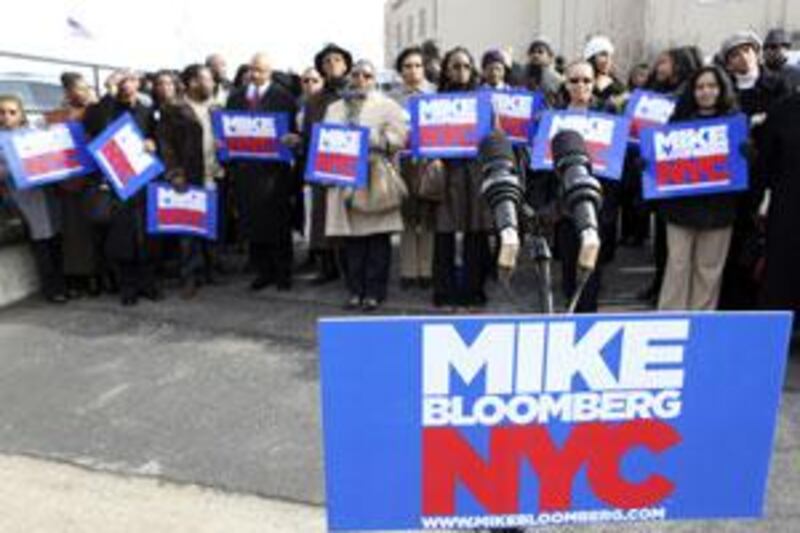NEW YORK // Come Tuesday, when Michael Bloomberg faces off against his Democratic contender William Thompson in New York's mayoral race, it will be a battle won more on style than substance. While he has certainly achieved a lot during his past two terms, it is Mr Bloomberg's style that is inimitable. Eight years ago, when he was known just as the richest man in New York, rumours were spreading about his political ambitions, but he had yet to announce he would run to be mayor of New York.
During an interview at the Park Avenue headquarters of Bloomberg LP, the firm he founded in 1986 after being fired from Salomon Brothers, Mr Bloomberg rested his feet on a coffee table and riffed teasingly about his ambitions. New Yorkers admired a self-made man, he said. Especially a stupendously rich one. The last thing the city needed was another party hack. After all, he said, there was no Republican or Democratic way to pick up rubbish.
He was disarmingly blunt for a man harbouring political ambitions and honest to the point of being obnoxious about the rewards of being a billionaire, neither trait usually associated with a politician. Still, Mr Bloomberg has turned out to be a stunningly popular and successful mayor of New York City. And he has done so on his own terms. He has refused to temper his acerbic personality or compromise his privacy.
He has used his fortune as a kind of nuclear arsenal, obliterating political opposition by outspending it. And on Tuesday, barring some unforeseen disasters, he will be elected to his third consecutive four-year term. The polls show him well ahead of his Democratic opponent, Mr Thompson. He has won almost every significant political endorsement in the city, from politicians, athletes, even leading black clergymen who are backing him over Mr Thompson, the highest-ranking African-American politician in the city.
In fact, since coming into office in 2001, in the wake of the September 11 attacks on New York, one of Mr Bloomberg's signature achievements has been to drain the city's race relations of much of their poison. During the term of his predecessor, Rudy Giuliani, there was a series of nasty confrontations between African Americans, the police and City Hall. Under Mr Bloomberg, racial issues have been handled with discretion and decorum.
Mr Thompson on the other hand, has pledged to focus on more quality of life issues, such as water and electricity rates, and to hold discussions on key issues such as education more inclusive. Mr Bloomberg many be a social liberal, but he brings a businessman's rigour to the city's operations and budget. In a city of aspiring immigrants, he represents the triumph of meritocracy, a self-made multibillionaire now running the political show. He is a hero to the city's small vendors and taxi drivers, the new arrivals from every corner of the world who hope their children may follow his path.
If you are talking about the power players in New York, there is no one even in the mayor's league, especially after the collapse on Wall Street. "There's been a major shift in the power structure in a short period of time," said Mort Zuckerman, a real-estate mogul and publisher of the Daily News. "It's hard to name many major players. Some of it is because of what's happening in the financial world. But much of the shift is because the mayor is so predominant."
The philosophy of "Bloombergism" is to purchase political office, by spending profligately and treating the traditional two-party campaign system with the utmost cynicism, and then to govern as a supra-political figure. This year, he is on pace to spend more than US$110 million (Dh403m) of his own money on his re-election. In three bids for mayor, he will have spent more than a quarter of a billion dollars. It is still chump change for a man worth an estimated $17.5bn.
"Whether Bloomberg wins or loses, the toxic combination of mega-spending and crass use of his office to bypass the voters on term limits will always be a stain on his mayoralty," said Gene Russianoff of the New York Public Interest Research Group. "These twin assaults on municipal democracy will undermine his political clout in a third term and sadly fuel public scepticism about elections and elected officials."
Four years ago, during his last campaign, he offered this brush-off to any who complained that he was buying office and spoiling the democratic system: "If you really believe that you're making a difference and that you can leave a legacy of better schools and jobs and safer streets, why would you not spend the money? The objective is to improve the schools, bring down crime, build affordable housing, clean the streets - not to have a fair fight." But while the streets of New York may be cleaner, there has been a startling rise in the number of people using homeless shelters, according to a report this week by the advocacy group Coalition for the Homeless. Since Mr
Mr Bloomberg took office eight years ago there has been a 45 per cent increase in shelter use with over 39,000 homeless people, including 10,000 homeless families, checking in to city shelters every evening. The group said 2009 has turned out to be the worst on record for New York City homelessness since the Great Depression. * The National






